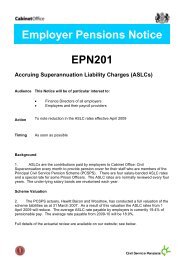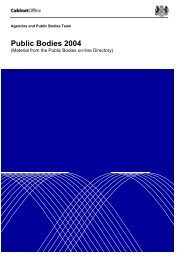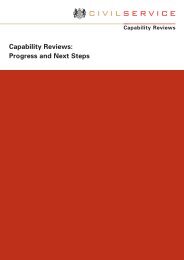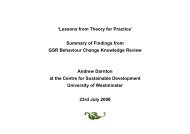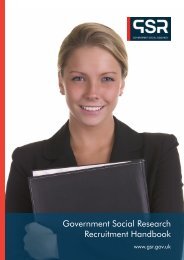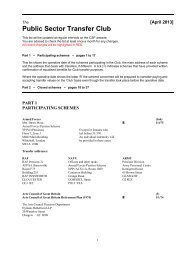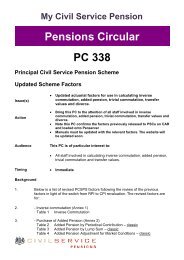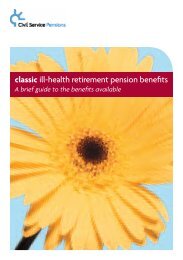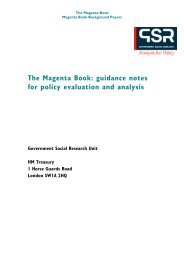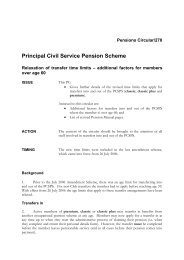Making Car Sharing and Car Clubs Work - Case ... - The Civil Service
Making Car Sharing and Car Clubs Work - Case ... - The Civil Service
Making Car Sharing and Car Clubs Work - Case ... - The Civil Service
You also want an ePaper? Increase the reach of your titles
YUMPU automatically turns print PDFs into web optimized ePapers that Google loves.
MAKING CAR SHARING AND CAR CLUBS WORKCASE STUDY SUMMARIESCouncil, dropping them off at County Hall on the way into the City). <strong>The</strong> two users that carshared had set up payment systems as follows: User 1 (approx. 25 miles): £3 a day return User 2 (approx. 10 miles): £1 per one-way trip (equivalent bus trip = £1.50)11.27 <strong>The</strong> first of these users had previously travelled by car, <strong>and</strong> the second had previouslytravelled by bus. Both had used the scheme to find partners. User 1 had met her partnerthrough the car share lunch, whilst User 2 had used the software only.11.28 <strong>The</strong> third user did not car share despite efforts to find a partner. <strong>The</strong>y felt that more could bedone to add a personal perspective (i.e. an appointed coordinator), but recognised that thiswould add costs to the scheme. <strong>The</strong>y were disappointed that a match had not been found,<strong>and</strong> suggested that the County Council do more to promote uptake, particularly with regardnew recruits (incentives offered as part of the recruitment package).11.29 In all cases, users recognised the costs savings associated with car sharing, <strong>and</strong> all had astrong belief in the environmental gains. Users had generally found car share partners to befriendly, with the longer term sharing partners having many common pastimes (<strong>and</strong> this hadresulted in the long term commitment to share). All users expressed some concerns overthe difficultly of being matched with an inappropriate partner (i.e. different tastes / likes), butfelt that the questions asked upon registration covered a good range of issues to filter thisout. It was suggested that more could be done however, such as an initial 3 day trial period,after which partners could separate without having to provide excuses which could bedifficult (one user had been let down by a potential partner in their work team the day beforethey were due to share, <strong>and</strong> this had caused some friction between them).11.30 All users felt that there was much more scope to develop car sharing further (both for thework journey <strong>and</strong> other trips), <strong>and</strong> felt that as congestion <strong>and</strong> parking problems got worselocally, then the opportunities for car sharing would increase significantly.Other General Issues11.31 Despite good take-up of the car sharing scheme, the car share coordinator recognises thatmore can be done to increase take-up rates. In particular, the scheme currently provideslittle incentive to car share, <strong>and</strong> work is underway to see how the scheme can be modified toprovide a direct gain for users. Given the rural location of Norfolk, <strong>and</strong> the dominance ofNorwich, car sharing is seen as a valuable tool in promoting accessibility in rural areas. Aspart of the second LTP, Norfolk will be examining how car sharing can be better promoted<strong>and</strong> integrated into conventional rural public transport service planning.11.32 In summary, the key lessons are:Good levels of take-up despite the lack of incentivesLow cost to set-up <strong>and</strong> administerIntegrates well with wider car sharing scheme covering Norfolk <strong>and</strong> other employers<strong>Work</strong>s alongside a package of measures promoted through the corporate travel planFinal V1.1, Dec. 2004 - 74 -



